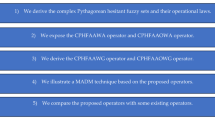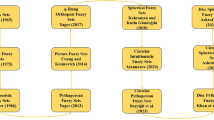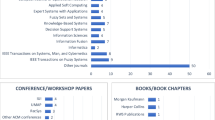Abstract
The large-scale group decision-making (GDM) problems with linguistic information have received more and more attentions; however, how to effectively manage the linguistic assessments provided by the large number of experts is still a challenge. In this paper, we employ the probabilistic linguistic term sets (PLTSs), which are the extension form of hesitant fuzzy linguistic term sets, to manage the large number of linguistic assessments. We also present a probabilistic linguistic distance measure for PLTSs. To address the large-scale probabilistic linguistic GDM problems in which the weights of groups are completely unknown or partially known in advance, we develop a probabilistic linguistic GDM method. First, we propose a consistency- and consensus-based model to objectively determine the weights of the groups. Then, to aggregate the opinions of all the groups, we propose a new probabilistic linguistic weighted arithmetic averaging operator and by using it the collective assessment of each alternative is obtained. Finally, the ranking of all alternatives is obtained on the basis of the dominance degrees and the optimal alternative is selected.
Similar content being viewed by others
Notes
In some situations, some participators may fail to provide their assessments or their opinions are loss in the decision-making process, i.e., \(e_{ij}^{k} =\)“–” and “–” denotes “no provided.” For this case, we stipulate that \(r_{ij}^{k\sigma } = 0\) if \(e_{ij}^{k} =\)“–”.
References
Chen, S.M., Hong, J.A.: Multicriteria linguistic decision making based on hesitant fuzzy linguistic term sets and the aggregation of fuzzy sets. Inf. Sci. 286, 63–74 (2014)
Chen, Z.S., Chin, K.S., Li, Y.L., et al.: Proportional hesitant fuzzy linguistic term set for multiple criteria group decision making. Inf. Sci. 357, 61–87 (2016)
Cabrerizo, F.J., Moreno, J.M., Pérez, I.J., et al.: Analyzing consensus approaches in fuzzy group decision making: advantages and drawbacks. Soft. Comput. 14(5), 451–463 (2010)
Dong, Y.C., Herrera-Viedma, E.: Consistency-driven automatic methodology to set interval numerical scales of 2-tuple linguistic term sets and its use in the linguistic GDM with preference relation. IEEE Trans. Cybern. 45(4), 780–792 (2015)
Dong, Y.C., Xu, Y., Yu, S.: Computing the numerical scale of the linguistic term set for the 2-tuple fuzzy linguistic representation model. IEEE Trans. Fuzzy Syst. 17(6), 1366–1378 (2009)
Gu, X.J., Xu, Z.S.: Novel basic operational laws for linguistic terms, hesitant fuzzy linguistic term sets and probabilistic linguistic term sets. Inf. Sci. 2(372), 407–427 (2016)
Herrera, F., Martínez, L.: A 2-tuple fuzzy linguistic representation model for computing with words. IEEE Trans. Fuzzy Syst. 8(6), 746–752 (2000)
Herrera-Viedma, E., Cabrerizo, F.J., Kacprzyk, J., et al.: A review of soft consensus models in a fuzzy environment. Inf. Fus. 17, 4–13 (2014)
Lee, L.W., Chen, S.M.: Fuzzy decision making based on likelihood-based comparison relations of hesitant fuzzy linguistic term sets and hesitant fuzzy linguistic operators. Inf. Sci. 294, 513–529 (2015)
Levrat, E., Voisin, A., Bombardier, S., et al.: Subjective evaluation of car seat comfort with fuzzy set techniques. Int. J. Intell. Syst. 12, 891–913 (1997)
Liao, H.C., Xu, Z.S., Zeng, X.J.: Hesitant fuzzy linguistic VIKOR method and its application in qualitative multiple criteria decision making. IEEE Trans. Fuzzy Syst. 23(5), 1343–1355 (2015)
Liao, H., Xu, Z., Zeng, X.J.: Distance and similarity measures for hesitant fuzzy linguistic term sets and their application in multi-criteria decision making. Inf. Sci. 271, 125–142 (2014)
Liu, B., Shen, Y., Chen, X., et al.: A partial binary tree DEA-DA cyclic classification model for decision makers in complex multi-attribute large-group interval-valued intuitionistic fuzzy decision-making problems. Inf. Fus. 18, 119–130 (2014)
Liu, H., Rodríguez, R.M.: A fuzzy envelope for hesitant fuzzy linguistic term set and its application to multicriteria decision making. Inf. Sci. 258, 220–238 (2014)
Liu, Y., Fan, Z.P., Zhang, X.: A method for large group decision-making based on evaluation information provided by participants from multiple groups. Inf. Fus. 29, 132–141 (2016)
Labella, Á., Liu, Y., Rodríguez, R.M., et al.: Analyzing the performance of classical consensus models in large scale group decision making: a comparative study. Appl. Soft Comput. (2017). doi:10.1016/j.asoc.2017.05.045
Mata, F., Martínez, L., Herrera-Viedma, E.: An adaptive consensus support model for group decision-making problems in a multigranular fuzzy linguistic context. IEEE Trans. Fuzzy Syst. 17(2), 279–290 (2009)
Martínez, L., Rodriguez, R.M., Herrera, F.: Dealing with Hesitant Fuzzy Linguistic Information in Decision Making//The 2-tuple Linguistic Model, pp. 113–129. Springer, Berlin (2015)
Martínez, L., Herrera, F.: An overview on the 2-tuple linguistic model for computing with words in decision making: extensions, applications and challenges. Inf. Sci. 207, 1–18 (2012)
Pang, Q., Wang, H., Xu, Z.S.: Probabilistic linguistic term sets in multi-attribute group decision making. Inf. Sci. 369, 128–143 (2016)
Palomares, I., Martinez, L., Herrera, F.: A consensus model to detect and manage noncooperative behaviors in large-scale group decision making. IEEE Trans. Fuzzy Syst. 22(3), 516–530 (2014)
Palomares, I., Martínez, L., Herrera, F.: MENTOR: a graphical monitoring tool of preferences evolution in large-scale group decision making. Knowl. Based Syst. 58, 66–74 (2014)
Rodriguez, R.M., Martinez, L., Herrera, F.: Hesitant fuzzy linguistic term sets for decision making. IEEE Trans. Fuzzy Syst. 20(1), 109–119 (2012)
Xu, Z., Wang, H.: On the syntax and semantics of virtual linguistic terms for information fusion in decision making. Inf. Fus. 34, 43–48 (2017)
Wang, H.: Extended hesitant fuzzy linguistic term sets and their aggregation in group decision making. Int. J. Comput. Intell. Syst. 8(1), 14–33 (2015)
Wang, H., Xu, Z.: Some consistency measures of extended hesitant fuzzy linguistic preference relations. Inf. Sci. 297, 316–331 (2015)
Wang, J., Wang, J., Zhang, H., et al.: Multi-criteria decision-making based on hesitant fuzzy linguistic term sets: an outranking approach. Knowl. Based Syst. 86, 224–236 (2015)
Wu, Z., Xu, J.: Possibility distribution-based approach for MAGDM with hesitant fuzzy linguistic information. IEEE Trans. Cybern. 46(3), 694–705 (2016)
Wu, Z., Xu, J.: A consistency and consensus based decision support model for group decision making with multiplicative preference relations. Decis. Support Syst. 52(3), 757–767 (2012)
Wu, Z., Xu, J.: Managing consistency and consensus in group decision making with hesitant fuzzy linguistic preference relations. Omega 65, 28–40 (2016)
Xu, Z.: Deviation measures of linguistic preference relations in group decision making. Omega 33(3), 249–254 (2005)
Xu, Z.: A method based on linguistic aggregation operators for group decision making with linguistic preference relations. Inf. Sci. 166(1), 19–30 (2004)
Xu, Z.: Linguistic Decision Making: Theory and Methods. Springer, Berlin (2013)
Xu, X., Du, Z., Chen, X.: Consensus model for multi-criteria large-group emergency decision making considering non-cooperative behaviors and minority opinions. Decis. Support Syst. 79, 150–160 (2015)
Yager, R.: An approach to ordinal decision making. Int. J. Approx. Reason. 12(3), 237–261 (1995)
Zhang, Y., Xu, Z., Wang, H., et al.: Consistency-based risk assessment with probabilistic linguistic preference relation. Appl. Soft Comput. 49, 817–833 (2016)
Zhang, G., Dong, Y., Xu, Y.: Consistency and consensus measures for linguistic preference relations based on distribution assessments. Inf. Fus. 17, 46–55 (2014)
Zhang, X.: Non-homogeneous linguistic multi-criteria group decision making with aspiration. Technique Report, pp. 1–15 (2017)
Zhang, X., Xu, Z.: Soft computing based on maximizing consensus and fuzzy TOPSIS approach to interval-valued intuitionistic fuzzy group decision making. Appl. Soft Comput. 26, 42–56 (2015)
Zhang, Z., Guo, C., Martínez, L.: Managing multi-granular linguistic distribution assessments in large-scale multiattribute group decision making. IEEE Trans. Syst. Man Cybern. Syst. (2016). doi:10.1109/TSMC.2016.2560521
Zhai, Y., Xu, Z., Liao, H.: Probabilistic linguistic vector-term set and its application in group decision making with multi-granular linguistic information. Appl. Soft Comput. 49, 801–816 (2016)
Zahir, S.: Clusters in a group: decision making in the vector space formulation of the analytic hierarchy process. Eur. J. Oper. Res. 112(3), 620–634 (1999)
Zhu, B., Xu, Z.: Consistency measures for hesitant fuzzy linguistic preference relations. IEEE Trans. Fuzzy Syst. 22(1), 35–45 (2014)
Acknowledgements
The author is very grateful to the anonymous reviewers and the editor for their insightful and constructive comments and suggestions that have led to an improved version of this paper. The work was supported by the National Natural Science Foundation of China (No. 71661010), the Natural Science Foundation of Jiangxi Province of China (No. 20161BAB211020) and the Technology Project of Education Department of Jiangxi Province of China (No. GJJ160455).
Author information
Authors and Affiliations
Corresponding author
Rights and permissions
About this article
Cite this article
Zhang, X. A Novel Probabilistic Linguistic Approach for Large-Scale Group Decision Making with Incomplete Weight Information. Int. J. Fuzzy Syst. 20, 2245–2256 (2018). https://doi.org/10.1007/s40815-017-0375-1
Received:
Revised:
Accepted:
Published:
Issue Date:
DOI: https://doi.org/10.1007/s40815-017-0375-1




